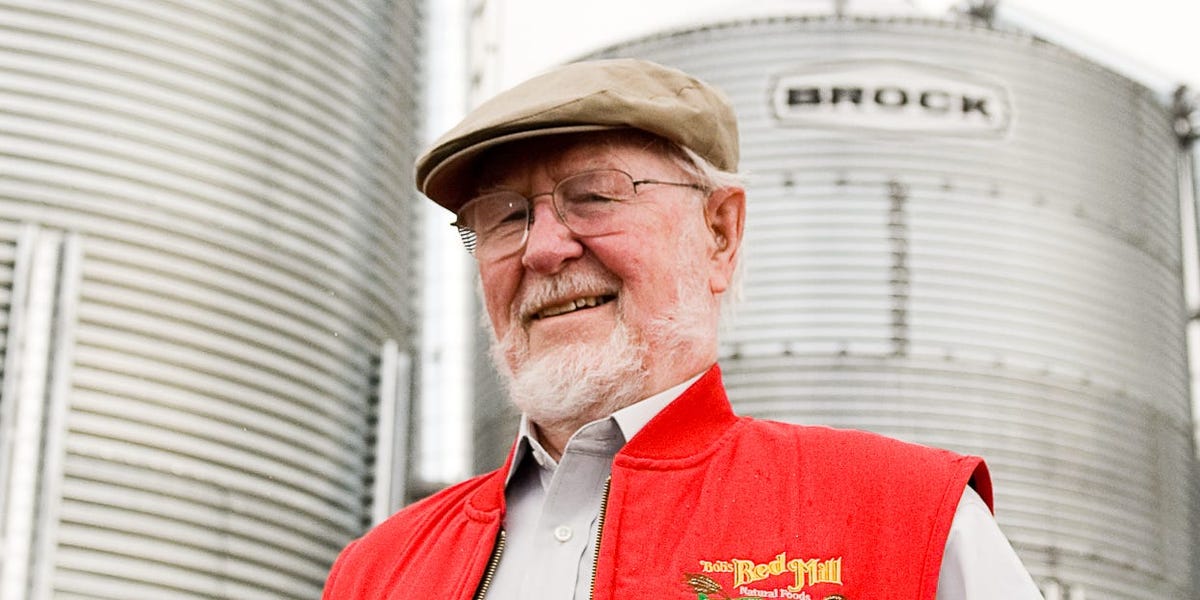Bob Moore sounds like he was a good dude. If more business leaders thought like him we’d all be a lot better off.
Sells good steel cut oats
I’m worried it’s the end of an era. They have really high quality product, all of it!
Could use more organic, though
But that’s the point: that level of wealth and power is unhealthy. For literally everyone. We can’t just hope more of these insanely privileged people resist corruption and greed to do the right thing and treat their employees fairly (more than fairly, in this case). He was a good dude all right, but a huge exception to the overwhelming norm of wealthy people exploiting their workers…
Socalism is quite a nice concept and one that has the potential to be implemented at a large scale.
This sounds like a mondragon corporation, a specific type of co-op primarily from the Basque region: https://en.wikipedia.org/wiki/Mondragon_Corporation?wprov=sfti1#
deleted by creator
Bob was genuinely a good man and the Red Mill products are amazing.
Communism! How dare he! Giving power to the people who built his wealth from? Might as well give him a parade in Red square!
But seriously people shouldn’t be able to transfer their corporations to their families. Once you die/retire it goes to the workers by law. If you didn’t amass enough wealth in that time frame maybe you should have budgeted better. Why should current and future workers continue supporting wealthy peoples children.
Estate taxes are the way to deal with that. Otherwise you potentially get massive distortionary effects from people trying to dump all their ownership into liquid assets right before they die, assuming that’s what you meant by wealth. It also gets odder when you no longer have a single owner. Jeff Bezos is fabulously wealthy and holds lots of stock in Amazon, but he does not own Amazon outright. You could say that when he dies, his stock goes to the workers. Okay, what about stock held by funds like Vanguard or pension funds? What does death even mean then? It’s a whole mess, or you could go with the simpler estate tax.
I think that’s why the extremely wealthy all have foundations.
Hmmm, how so? My impression is that it is so that they can write it off on their taxes, but still how control over how the money is spent.
That’s just a larger issue with run away capitalism. If politicians, judges, and presidents weren’t in for the money as well. Immorality should never be rewarded. #Vote
I mean, private ownership of capital should just not be provided and enforced by government in the first place, that would be a lot simpler than some automatic death-bed transfer. End capitalism, before it ends us.
Communism
Socialism, actually.
People are careful with their words on this and often act like it’s a gift. It’s an ESOP so he sold it to his employees. That said, it’s still a better model than selling to a public company and I’m sure he did take a loss on it compared to that.
From the perspective of the employee it basically is a gift (more a benefit).
Employees don’t pay for stock in an ESOP; they’re earned by being employed there (with different options for how they’re divided, but restrictions so they aren’t excessively dominated by the highest earners).
ESOP is a thing… the question is who gets to make decisions. Is the board run by employees? I used to work for an ESOP, but the scheme was little more than a way for the founders to cash out on their investment by saddling the company with the debt to buy itself… all while still retaining control of the board. Despite being employee-owned, employees had no decision making power.
An ESOP is generally going to be better than sale to venture capital. That said for folks considering this I’d recommend conversion to a worker coop, since then employees both own the business and make decisions for the business.
My wife’s company got bought out by an ESOP company. When she explained it to me, the whole thing sounded like a scam. I’m not qualified to explain it but it sounds like the stock never vests until you retire so no one has any control outside of the incompetent execs who run the thing.
Yeah… and a lot of companies use this to replace your 401k or in lieu of contributing to one. So, a big chunk of your retirement savings is tied up in the company and usually can’t be diversified until you’re pretty close to retirement age.
Alternatively, if you leave the company, many will let you take money out and roll it into an IRA, but it’s usually capped at like $5k per year. It can take a long time to get your money out.
That’s not necessarily a feature of ESOP.
My first ESOP vested 100% on day 1, we also had a 401k with matching, with a discretionary amount added from the company depending on how well the company did that year (never saw less than 10% of my salary in the years I was there). If/when you leave the company, you’re payed out within 3 years.
For my second ESOP it was a 3 year vesting schedule, no 401k matching and no discretionary amount (though ESOP contribution was ~10% of salary, depending on company performance). If/when you leave the company, you’re payed out starting at year 6, over a period of a few years (can’t remember exactly).
I say all this to demonstrate that these things can be set up very differently while all still being an ESOP generally.
Yeah, and basically my point was that ESOP doesn’t mean you can’t fuck over the employees. I’m sure some versions of it are really good, but until no versions of it suck, it’s hard to say it’s necessarily better.
It certainly is a step in the right direction, but it still allows some really shitty structures.
That said, good post and good examples.
Aww, I love their weird flours!
I have a Gluten Intolerant relative so I tried baking with their GF flour once, I can never get the stuff to rise with yeast but I came pretty close once by letting it sit with water long enough to form a sourdough.
Great for breading fried foods, though. A little fish or eggplant rolled in egg and then rolled in flour then thrown in a pan full of butter then covered in salt and pepper 10/10.
It’s definitely tricky. I’ve had the most luck with quick breads like pumpkin or zucchini leavened with baking powder, but the recipes always need tweaking or you end up with a loaf pan of wet oatmeal with a leathery skin on top even after baking it for a couple hours. Sometimes I have to finish them in the microwave (in a glass loaf pan).
Sometimes I think we’ve invested too much into GF flour and nothing into a GF Yeast Strain.
I thought GF stood for girlfriend until I thought about it a bit more.
My GF is GF, so today I made GF waffles for my GF GF.
Yeast has no gluten naturally…
By gluten free yeast strain I was referring to a bacterial culture that works in gluten free flour. As I explained before, the gluten free flour doesn’t rise with yeast, because the bacteria cultures used in breadmaking are suited for turning wheat and similar grain starches into sugars and alcohol.
I could be totally wrong, maybe the lack of gluten to capture carbon dioxide put off by the yeast’s processes is the problem, or maybe it’s an issue with the ratio of binding agents to water, but I have a feeling we could make a more specialized strain for various flours if we tried.
I see what you mean, and sorry, I hadn’t previously associated your two comments as being the same person.
I think that your second hypothesis is more or less correct. The long gluten chains give the dough the elasticity to stretch and contain the bubbles.
I’ve heard other people say that a sourdough works better, as well. You have a good point, maybe some combination of a yeast and a bacteria that act more symbiotically together could be beneficial.
I’m not sure how the bacterial action that creates sourdough improves a gluten-free bread, though. It seems intuitively unlikely to me that it would be by breaking anything down, as we want more elasticity that, in wheat based breads, comes from building up the long gluten chains by kneading.
Maybe it is the bacterial bodies themselves? Xanthan gum is very commonly used in gluten-free flour to help it hold together and have more elasticity. Xanthan gum, as I understand it, is derived from the mash made after fermenting sugar with a specific bacterial strain.
May his legacy inspire mankind to become something great.
Laughing in the back of my head I heard. “what is dead may never die”
Based
This is the best summary I could come up with:
Moore, who was 94 when he died, founded Bob’s Red Mill with his wife, Charlee, in Oregon in 1978.
In the decades that followed, the couple grew their whole-grain food company into a global empire that did more than $100 million annually, selling over 200 products in more than 70 countries.
When asked why he chose an employee-owned model during an interview with Portland Monthly last year, Moore, who was Christian, cited the bible.
“The more everyone organizes and works hard, the greater the profitability of the company, and that translates into higher value of ownership,” Moore told Portland Monthly.
In 2022, when some business leaders were complaining about a labor shortage, Moore said executive greed was to blame and that more companies could adopt the ESOP model, Fortune reported.
He said employees at Bob’s Red Mill feel valued and informed, an approach other companies could learn from.
The original article contains 554 words, the summary contains 148 words. Saved 73%. I’m a bot and I’m open source!
Okay serious question, how the fuck is this Christian and the Westboro Baptist Church Christian??? I know but still I will never be able to get it.
Schröedinger’s Christian: simultaneously wonderful and just the worst.
Sounds like a good guy
Honestly, the retail shop and restaurant really went downhill shortly after that happened. My family used to eat there weekly. Breakfasts were excellent and nicely priced. Over the next couple years we just stopped.
Now I just miss that vegetarian sausage omelette with those cheesy grits.
I don’t know why those things seemed to coincide but the handover was in the local news a lot and shortly thereafter it just seemed to begin its decline.
That’s too bad. I had moved away from Milwaukie by then so it wasn’t really practical for me to make my way down there. I still eat a lot of their grains and other products, though.
Yeah. I still buy a lot of their products especially the Artisan Flours. Such great products.
He initiated the ESOP in 2010 so maybe it’s worth trying again?
I tried many times including multiple times a few years ago (after they put up the big outside area). Still disappointing, sadly.
I’ve had the privilege of working for 2 employee owned companies in the past and both were a positive experience.
I’d love to try that.
Oh, I always wondered if he was a real guy when I look at that bag of flaxseed…








